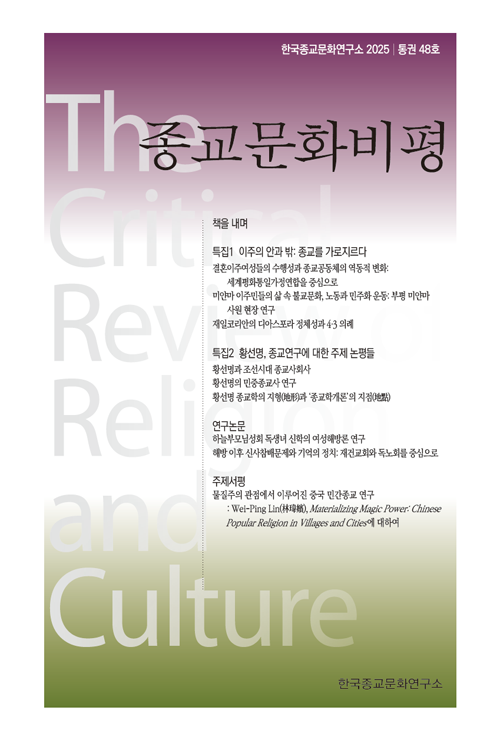- 영문명
- A Feminist Study of the Theology of the Only Begotten Daughter of Heavenly Parent’s Holy Community
- 발행기관
- 한국종교문화연구소
- 저자명
- 이정은(Jung Eun Lee)
- 간행물 정보
- 『한국종교문화연구소 단행본』종교문화비평 48, 251~304쪽, 전체 54쪽
- 주제분류
- 인문학 > 종교학
- 파일형태
- 발행일자
- 2025.09.30
9,280원
구매일시로부터 72시간 이내에 다운로드 가능합니다.
이 학술논문 정보는 (주)교보문고와 각 발행기관 사이에 저작물 이용 계약이 체결된 것으로, 교보문고를 통해 제공되고 있습니다.

국문 초록
본 논문은 하늘부모님성회 세계평화통일가정연합 측 독생녀 신학의 등장과이를 둘러싼 논란, 이 신학의 내용적 특징, ‘여성해방’의 관점에서 볼 때의 한계등을 고찰하는 것을 목적으로 한다. 하늘부모님성회는 2012년 9월 3일 사망한통일교 창시자 문선명의 종교적 유산을 계승했다고 하는 후계 공동체 중 한 곳으로, 문선명과 함께 참부모로 신앙된 한학자가 그 지도자로 있는 종교 단체이다. 한학자 총재는 2013년 음력 1월 13일, 그리스도교의 천년왕국에 준하는 이상세계인 천일국(天一國)이 시작되었음을 선언한다. 이 기반 위에 2014년, 그녀는자신이 ‘6천 년 만에 최초로 원죄 없이 태어난 독생녀’임을 천명한다. 성회 측에의하면, 독생녀는 독생자(獨生子)에 대응하는 인물로, 하늘부모님의 유일한 직계딸(獨生女)을 의미한다. 그녀의 독생녀 선언 이후, 하늘부모님성회 신학자들은자신들의 ‘독생녀 신학’이라 명명한 새로운 신학 담론을 구축하기 시작한다.
이 신학을 종교학적이면서도 여성해방론적 시각에서 비평적으로 연구하는 것은 처음 시도되는 것으로, 현재까지 이 신학에 대한 논의는 그 내용이 비판적이든옹호적이든 주로 통일교 신앙을 가진 이들에 의해 이루어져 왔다. 본고에서는신학적이라 할 수 있는 이러한 기존 논의를 포함하여, 성회 측 경전 및 독생녀신학 관련 저작들을 주요 자료로 삼아, 이 신학에 대한 분석을 다음과 같이 진행하였다. 2장에서는 독생녀 신학의 등장 배경이 되는 통일교의 분화와 하늘부모님성회의 성립 과정을 주되게 살펴보았다. 3장에서는 성회 시대가 열리는 가운데등장한 독생녀 신학이 성회 안팎에 불러온 논란의 주요한 쟁점을 정리하고, 이논란이 ‘통일교 정체성’에 대한 각기 다른 인식에서 비롯된 측면이 있음을 밝혔다. 4장에서는 독생녀 신학의 여성해방론을 비평적으로 고찰하였다. 그 분석의 결과는 다음과 같다. 독생녀 신학은 통일교회 초창기부터 주장되어 온 ‘혈통신앙’의 가르침을 고수하고 있다. 이 혈통신앙은 태어날 때부터 깨끗한 피를 가진 존재와그렇지 않은 존재 사이에 철저한 위계를 상정한다. 따라서 이 신앙이 지금과같은 형태로 유지되는 한, 독생녀의 주체화 또는 해방이 여성 (신도) 일반의 해방으로 확장될 가능성은 거의 없다.
영문 초록
This paper aims to examine the emergence of the Theology of the Only Begotten Daughter(hereafter the OBD Theology) by Heavenly Parent’s Holy Community(hereafter HPHC), the controversies surrounding it, the theological characteristics of this doctrine, and its limitations from a feminist perspective. The HPHC is one of the successor communities that claims to inherit the religious legacy of Sun Myung Moon, the founder of the Unification Church who passed away on September 3, 2012. It is a religious organization led by Hak Ja Han, who has been revered together with Moon as the True Parents. On January 13, 2013 (lunar calendar), President Han proclaimed the beginning of the Cheon Il Guk(天一國) era, an ideal world comparable to the Christian concept of the millennial kingdom. Building on this foundation, in 2014 she declared herself to be the Dok Saeng Nyeo—the first person in six thousand years to be born without original sin. According to the HPHC, Dok Saeng Nyeo(獨生女, the Only Begotten Daughter, hereafter the OBD) corresponds to the Only Son(獨生子) and signifies the one and only direct daughter of the Heavenly Parent. Following her OBD declaration, theologians of the HPHC began to construct a new theological discourse, which they termed “OBD theology.”
This is the first attempt to critically study the OBD Theology from a religious studies and feminist perspective. Until now, discussions on this theology—whether critical or supportive—have primarily been carried out by members of the Unification Church. This study analyzes the OBD Theology using existing theological studies, the HPHC's scriptures and writings related to the Theology as its main sources. Chapter 2 focuses on the background of the OBD Theology’s emergence, particularly the schism within the Unification Church and the formation of HPHC. Chapter 3 summarizes the main points of controversy that this Theology, which began with Han's declaration of the OBD, has caused both inside and outside HPHC, and reveals that this controversy stems from different perceptions of ‘Unification Church identity.’ Chapter 4 critically analyzes the content of women's liberation theory as presented in the OBD Theology. The findings of this analysis are as follows: the proponents of this Theology continue to uphold the Unification Church’s original doctrine of ‘true blood lineage faith.’ This lineage faith presupposes a strict hierarchy between those who are born with pure blood and those who are not. As long as this belief system remains in its current form, there is little possibility that the subjectification or liberation of the OBD will extend to the liberation of women (believers) in general.
목차
Ⅰ. 서론
Ⅱ. 참아버지의 통일교를 거쳐 하늘부모님성회 시대로
Ⅲ. 독생녀 신학을 둘러싼 통일교 정체성 논쟁
Ⅳ. 독생녀 주체화와 여성해방 사이의 혈통신앙
Ⅴ. 결론
참고문헌
키워드
하늘부모님성회 세계평화통일가정연합
통일교
독생녀 신학
페미니즘
여성해방
혈통신앙
문선명
한학자
Heavenly Parent’s Holy Community(HPHC)
Family Federation for
World Peace and Unification(FFWPU)
the Theology of the Only
Begotten Daughter
Dok Saeng Nye(獨生女
the Only Begotten
Daughter
the OBD)
feminism
faith in true blood lineage
Sun
Myung Moon
Hak Ja Han
해당간행물 수록 논문
- 종교문화비평 48 목차
- 황선명과 조선시대 종교사회사
- 하늘부모님성회 독생녀 신학의 여성해방론 연구
- 결혼이주여성들의 수행성과 종교공동체의 역동적 변화: 세계평화통일가정연합을 중심으로
- 미얀마 이주민들의 삶 속 불교문화, 노동과 민주화 운동: 부평 미얀마 사원 현장 연구
- 재일코리안의 디아스포라 정체성과 4·3 의례
- 황선명의 민중종교사 연구
- 황선명 종교학의 지형(地形)과 ‘종교학개론’의 지점(地點)
- [주제서평] 물질주의 관점에서 이루어진 중국 민간종교 연구 : Wei-Ping Lin(林瑋嬪), Materializing Magic Power: Chinese Popular Religion in Villages and Cities에 대하여
- 해방 이후 신사참배문제와 기억의 정치: 재건교회와 독노회를 중심으로
참고문헌
교보eBook 첫 방문을 환영 합니다!

신규가입 혜택 지급이 완료 되었습니다.
바로 사용 가능한 교보e캐시 1,000원 (유효기간 7일)
지금 바로 교보eBook의 다양한 콘텐츠를 이용해 보세요!



